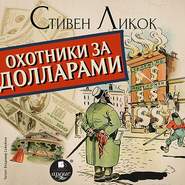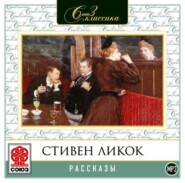По всем вопросам обращайтесь на: info@litportal.ru
(©) 2003-2024.
✖
Behind the Beyond, and Other Contributions to Human Knowledge
Автор
Год написания книги
2019
Настройки чтения
Размер шрифта
Высота строк
Поля
As he sits there, the valet enters with a telegram on a tray.
"A telegram, Sir John."
Sir John (dazed and trying to collect himself), "What?"
"A telegram, sir,—a cablegram."
Sir John takes it, opens it and reads aloud:
"He is dead. My duty is ended. I am coming home—Margaret Harding."
"Margaret coming home. It only needed that—my God."
. . . . . .
As he says it, the curtain falls.
The lights flick up. There is a great burst of applause. The curtain rises and falls. Lady Cicely and Mr. Harding and Sir John all come out and bow charmingly. There is no trace of worry on their faces, and they hold one another's hands. Then the curtain falls and the orchestra breaks out into a Winter Garden waltz. The boxes buzz with discussion. Some of the people think that Lady Cicely is right in claiming the right to realize herself: others think that before realizing herself she should have developed herself. Others ask indignantly how she could know herself if her husband refused to let her be herself. But everybody feels that the subject is a delicious one.
Those of the people who have seen the play before very kindly explain how it ends, so as to help the rest to enjoy it. But the more serious-minded of the men have risen, very gently, and are sneaking up the aisles. Their expression is stamped with deep thought as if pondering over the play. But their step is as that of leopards on the march, and no one is deceived as to their purpose.
The music continues. The discussion goes on.
The leopards come stealing back. The orchestra boils over in a cadence and stops. The theater is darkened again. The footlights come on with a flash. The curtain silently lifts, and it is—
Act II.—Six Months Later
THE programs rustle. The people look to see where it is. And they find that it is "An Apartment in Paris." Notice that this place which is used in every problem play is just called An Apartment. It is not called Mr. Harding's Apartment, or an Apartment for which Mr. Harding pays the Rent. Not a bit. It is just an Apartment. Even if it were "A Apartment" it would feel easier. But "An Apartment"!! The very words give the audience a delicious shiver of uncomfortableness.
When the curtain rises it discloses a French maid moving about the stage in four-dollar silk stockings. She is setting things on a little table, evidently for supper. She explains this in French as she does it, so as to make it clear.
"Bon! la serviette de monsieur! bon! la serviette de madame, bien—du champagne, bon! langouste aux champignons, bien, bon.—" This is all the French she knows, poor little thing, but langouste aux champignons beats the audience, so she is all right.
Anyway, this supper scene has to come in. It is symbolical. You can't really show Amalfi and Fiesole and the orange trees, so this kind of supper takes their place.
As the maid moves about there is a loud knock at the cardboard door of the apartment. A man in official clothes sticks his head in. He is evidently a postal special messenger because he is all in postal attire with a postal glazed hat.
"Monsieur Arrding?" he says.
"Oui."
"Bon! Une lettre."
"Merci, monsieur." He goes out. The audience feel a thrill of pride at having learned French and being able to follow the intense realism of this dialogue. The maid lays the letter on the supper table.
Just as she does it the door opens and there enter Mr. Harding and Lady Cicely. Yes, them. Both of them. The audience catches it like a flash. They live here.
Lady Cicely throws aside her cloak. There is great gaiety in her manner. Her face is paler. There is a bright spot in each cheek. Her eyes are very bright.
There follows the well-known supper scene. Lady Cicely is very gay. She pours champagne into Mr. Harding's glass. They both drink from it. She asks him if he is a happy boy now. He says he is. She runs her fingers through his hair. He kisses her on the bare shoulder. This is also symbolic.
Lady Cicely rattles on about Amalfi and Fiesole. She asks Mr. Harding if he remembers that night in the olive trees at Santa Clara, with just one thrush singing in the night sky. He says he does. He remembers the very thrush. You can see from the talk that they have been all over Baedeker's guide to the Adriatic.
At times Lady Cicely's animation breaks. She falls into a fit of coughing and presses her hand to her side. Mr. Harding looks at her apprehensively. She says, "It is nothing, silly boy, it will be gone in a moment." It is only because she is so happy.
Then, quite suddenly, she breaks down and falls at Mr. Harding's knees.
"Oh, Jack, Jack, I can't stand it! I can't stand it any longer. It is choking me!"
"My darling, what is it?"
"This, all this, it is choking me—this apartment, these pictures, the French maid, all of it. I can't stand it. I'm being suffocated. Oh, Jack, take me away—take me somewhere where it is quiet, take me to Norway to the great solemn hills and the fjords–"
Then suddenly Mr. Harding sees the letter in its light blue envelope lying on the supper table. It has been lying right beside him for ten minutes. Everybody in the theater could see it and was getting uncomfortable about it. He clutches it and tears it open. There is a hunted look in his face as he reads.
"What is it?"
"My mother—good God, she is coming. She is at the Bristol and is coming here. What can I do?"
Lady Cicely is quiet now.
"Does she know?"
"Nothing, nothing."
"How did she find you?"
"I don't know. I can't imagine. I knew when I saw in the papers that my father was dead that she would come home. But I kept back the address. I told the solicitors, curse them, to keep it secret."
Mr. Harding paces the stage giving an imitation of a weak man trapped. He keeps muttering, "What can I do?"
Lady Cicely speaks very firmly and proudly. "Jack."
"What?"
"There is only one thing to do. Tell her."
Mr. Harding, aghast, "Tell her?"
"Yes, tell her about our love, about everything. I am not ashamed. Let her judge me."
Mr. Harding sinks into a chair. He keeps shivering and saying, "I tell you, I can't; I can't. She wouldn't understand." The letter is fluttering in his hand. His face is contemptible. He does it splendidly. Lady Cicely picks the letter from his hand. She reads it aloud, her eyes widening as she reads:
Hotel Bristol, Paris.
My Darling Boy:
I have found you at last—why have you sought to avoid me? God grant there is nothing wrong. He is dead, the man I taught you to call your father, and I can tell you all now. I am coming to you this instant.














